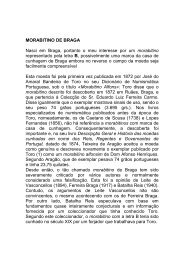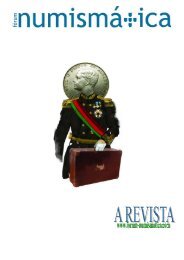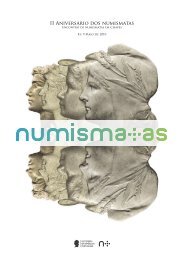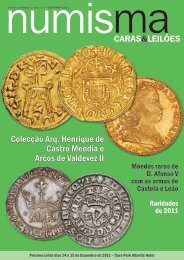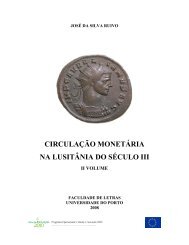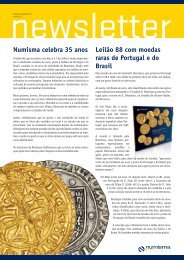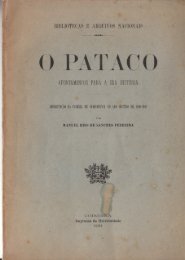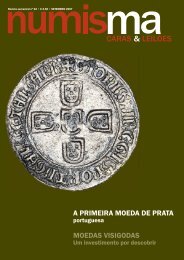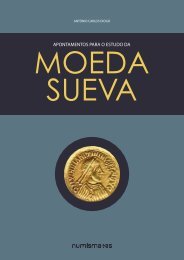You also want an ePaper? Increase the reach of your titles
YUMPU automatically turns print PDFs into web optimized ePapers that Google loves.
On 25 December, Christmas Day, Clement was consecrated and Henry and Agnes were crowned Holy Roman<br />
Emperor and Empress. The populace gave him the golden chain <strong>of</strong> the patriciate and made him patricius, giving the<br />
powers, seemingly, <strong>of</strong> the Crescentii family during the tenth century: the power to nominate popes. Henry's first acts<br />
were to visit Frascati, capital <strong>of</strong> the counts <strong>of</strong> Tusculum, and seize all the castles <strong>of</strong> the Crescentii. He and the pope<br />
then moved south, where his father had created the situation as it was then in his visit <strong>of</strong> 1038. Henry reversed<br />
many <strong>of</strong> Conrad's acts. At Capua, he was received by Prince Guaimar IV <strong>of</strong> Salerno, also Prince <strong>of</strong> Capua since<br />
1038. However, Henry gave Capua back to the twice-deprived Prince Pandulf IV, a highly unpopular choice. Guaimar<br />
had been acclaimed as Duke <strong>of</strong> Apulia and Calabria by the Norman mercenaries under William Iron Arm and his<br />
brother Drogo <strong>of</strong> Hauteville. In return, Guaimar had recognised the conquests <strong>of</strong> the Normans and invested William<br />
as his vassal with the <strong>com</strong>ital title. Henry made Drogo, William's successor in Apulia, a direct vassal <strong>of</strong> the imperial<br />
crown. He did likewise to Ranulf Drengot, the count <strong>of</strong> Aversa, who had been a vassal <strong>of</strong> Guaimar as Prince <strong>of</strong><br />
Capua. Thus, Guaimar was deprived <strong>of</strong> his greatest vassals, his principality split in two, and his greatest enemy reinstated.<br />
Henry lost popularity amongst the Lombards with these decisions and Benevento, though a papal vassal,<br />
would not admit him. He authorised Drogo to conquer it and headed north to reunion with Agnes at Ravenna. He<br />
arrived at Verona in May and the Italian circuit was <strong>com</strong>pleted.<br />
On Henry's return to Germany, many <strong>of</strong>fices which had fallen vacant were filled. First, Henry gave away his last personal<br />
duchy: he made Welf duke <strong>of</strong> Carinthia. He made his Italian chancellor, Humphrey, archbishop <strong>of</strong> Ravenna. He<br />
filled several other sees: he installed Guido in Piacenza, his chaplain Theodoric in Verdun, the provost Herman <strong>of</strong><br />
Speyer in Strasbourg, and his German chancellor Theodoric in Constance. The important Lorrainer bishoprics <strong>of</strong><br />
Metz and Trier received respecively Adalberon and Eberhard, a chaplain.<br />
The many vacancies <strong>of</strong> the Imperial episcopate now filled, Henry was at Metz (July 1047) when the rebellion then<br />
stewing broke out seriously. Godfrey was now allied with Baldwin <strong>of</strong> Flanders, his son (the margrave <strong>of</strong> Antwerp),<br />
Dirk <strong>of</strong> Holland, and Herman, Count <strong>of</strong> Mons. Henry gathered an army and went north, where he gave Adalbert <strong>of</strong><br />
Bremen lands once Godfrey's and oversaw the trial by <strong>com</strong>bat <strong>of</strong> Thietmar, the brother <strong>of</strong> Bernard II, Duke <strong>of</strong><br />
Saxony, accused <strong>of</strong> plotting to kill the king. Bernard, an enemy <strong>of</strong> Adalbert's, was now clearly on Henry's bad side.<br />
Henry made peace with the new king <strong>of</strong> Hungary, Andrew I and moved his campaign into the Netherlands. At<br />
Flushing, he was defeated by Dirk. The Hollanders sacked Charlemagne's palace at Nijmegen and burnt Verdun.<br />
Godfrey then made public penance and assisted in rebuilding Verdun. The rebels besieged Liège, defended stoutly<br />
by Bishop Wazo. Henry slowed his campaigning after the death <strong>of</strong> Henry <strong>of</strong> <strong>Bavaria</strong> and gave Upper Lorraine to one<br />
Adalbert and left. The pope had died in the meantime and Henry chose Poppo <strong>of</strong> Brixen, who took the name<br />
Damasus II. Henry gave <strong>Bavaria</strong> to one Cuno and, at Ulm in January 1048, Swabia to Otto <strong>of</strong> Schweinfurt, called the<br />
White. Henry met Henry <strong>of</strong> France, probably at Ivois again, in October and at Christmas, envoys from Rome came to<br />
seek a new pope, Damasus having died. Henry's most enduring papal selection was Bruno <strong>of</strong> Toul, who took <strong>of</strong>fice<br />
as Leo IX, and under whom the Church would be divided between East and West. Henry's final appointment <strong>of</strong> this<br />
long spate was a successor to Adalber in Lorraine. For this, he appointed Gerard <strong>of</strong> Chatenoy, a relative <strong>of</strong> Adalbert<br />
and Henry himself.<br />
The year <strong>of</strong> 1049 was a series <strong>of</strong> successes. Dirk <strong>of</strong> Holland was defeated and killed. Adalbert <strong>of</strong> Bremen managed<br />
a peace with Bernard <strong>of</strong> Saxony and negotiated a treaty with the missionary monarch Sweyn II <strong>of</strong> Denmark. With the<br />
assistance <strong>of</strong> Sweyn and Edward the Confessor <strong>of</strong> England, whose enemies Baldwin had harboured, Baldwin <strong>of</strong><br />
Flanders was unable to harassed by sea and unable to escape the onslaught <strong>of</strong> the imperial army. At Cologne, the<br />
pope ex<strong>com</strong>municated Godfrey, in revolt again, and Baldwin. The former abandoned his allies and was imprisoned<br />
by the emperor yet again. Baldwin too gave in under the pressure <strong>of</strong> Henry's ravages. Finally, war had ceased in the<br />
Low Countries and the Lorraines and peace seemed to have taken hold.<br />
In 1051, Henry undertook a third Hungarian campaign, but failed to achieve anything lasting. Lower Lorraine gave<br />
trouble again, Lambert, Count <strong>of</strong> Louvain, and Richildis, widow Herman <strong>of</strong> Mons, and new bride <strong>of</strong> Baldwin <strong>of</strong><br />
Antwerp, were causing strife. Godfrey was released and to him was it given to safeguard the unstable peace<br />
attained two years before.<br />
In 1052, a fourth campaign was undertaken against Hungary and Pressburg (modern Bratislava) was besieged.<br />
Andrew <strong>of</strong> Hungary called in the pope's mediation, but upon Henry's lifting <strong>of</strong> the siege, Andrew withdrew all <strong>of</strong>fers <strong>of</strong><br />
tribute and Leo IX ex<strong>com</strong>municated him at Regensburg. Henry was unable immediately to continue his campaign,<br />
however. In fact, he never renewed it in all his life. Henry did send a Swabian army to assist Leo in Italy, but he<br />
recalled it quickly. In Christmas <strong>of</strong> that year, Cuno <strong>of</strong> <strong>Bavaria</strong> was summoned to Merseburg and deposed by a small<br />
council <strong>of</strong> princes for his conflicting with Gebhard III, Bishop <strong>of</strong> Regensburg. Cuno revolted.





